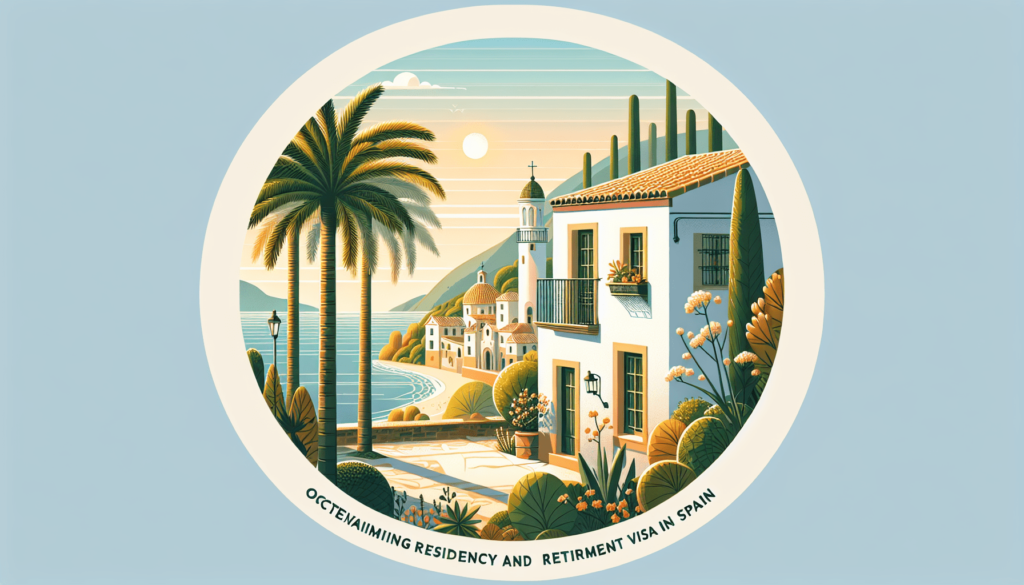Are you dreaming of sunny days in beautiful Spain? You’re in luck! In this helpful guide, you’ll discover how to obtain residency or a retirement visa in Spain, making your transition seamless. From understanding the different types of visas available to gathering all the required documents, we’ll walk you through each step. By the end, you’ll have everything you need to know to start your exciting new chapter in one of Europe’s most charming countries. So, let’s embark on this journey to make Spain your new home!
How Do I Obtain Residency Or A Retirement Visa In Spain?
Check out our recommended retirement gifts!
Introduction
Ever thought about swapping your hectic routine for siestas and sangria under the Spanish sun? The idea of moving to Spain for its warm climate, rich culture, and relaxed lifestyle is a dream for many. But how exactly do you obtain residency or a retirement visa in Spain? If you’re thinking about making Spain your next adventure, you’re in the right place!
Why Choose Spain?
Spain is one of the most popular destinations for expats and retirees and for good reason. Its cost of living is relatively affordable compared to other Western European countries. Plus, it offers splendid weather, friendly locals, and an outstanding healthcare system. Whether you’re considering Madrid, Barcelona, Valencia, or a quaint village in Andalusia, Spain’s got you covered. But before you start packing your bags, let’s get into the nitty-gritty of how you can make your dream a reality.

Check out our recommended retirement gifts!
Types of Residency Visas in Spain
When it comes to obtaining residency in Spain, there are several options available. The type of visa you need will depend on your specific situation, financial status, and long-term goals. Here are some of the most common types of residency visas:
| Visa Type | Description |
|---|---|
| Non-Lucrative Visa | Ideal for retirees or individuals not planning to work in Spain. |
| Golden Visa | For those who can make a significant investment in Spanish property or business. |
| Work Visa | Needed if you plan to be employed by a Spanish company. |
| Student Visa | If you plan to study in Spain. |
| EU Blue Card | For high-skilled workers. |
Let’s dive deeper into each type.
Non-Lucrative Visa
This is perhaps the most suitable option for retirees or those who do not intend to seek employment in Spain. The Non-Lucrative Visa allows you to reside in Spain on the condition that you have sufficient financial means to support yourself without working.
Eligibility
- Financial Means: You must demonstrate financial self-sufficiency, often around €25,560 per year.
- Health Insurance: Private health insurance coverage in Spain.
- Clean Criminal Record: A clean criminal background check.
Process
- Application: Submit your application at the Spanish Consulate in your home country.
- Documentation: Required documents include passport, proof of financial means, health insurance, and clean criminal record.
- Approval: The consulate will review your application, which usually takes a few months.
- Entry: Once approved, you can enter Spain and must register with local authorities.
Golden Visa
If you have the means to make a significant financial investment in Spain, the Golden Visa is an attractive option. It’s designed to encourage foreign investments in the country.
Eligibility
- Investment: Minimum €500,000 in Spanish real estate, or other investments like government bonds.
- Stay Duration: Valid initially for one year and can be extended.
- Family: Your family can also obtain residency through this visa.
Process
- Investment: Make the necessary investment before applying.
- Documentation: Submit proof of investment, passport, and other required documents.
- Application: Apply at the Spanish Consulate or within Spain.
- Approval: Upon approval, you can reside in Spain along with your family.
Work Visa
If you plan to work in Spain, you’ll need a work visa. This applies whether you are transferring within a company, hired by a Spanish company, or self-employed.
Eligibility
- Job Offer: A formal job offer or work contract from a Spanish employer.
- Qualifications: Relevant qualifications for the job.
- Health Insurance: Health insurance coverage.
Process
- Job Search: Secure a job in Spain.
- Documentation: Submit your job contract, qualifications, and other required documents.
- Application: Apply for the work visa at the Spanish Consulate.
- Approval: Once approved, register with Spanish social security and local authorities.
Student Visa
Planning to further your education in Spain? The student visa allows you to reside in Spain while pursuing your studies.
Eligibility
- Admission: Acceptance letter from a Spanish educational institution.
- Financial Means: Proof to support yourself.
- Health Insurance: Private health insurance.
Process
- Admission: Secure admission to an educational institution in Spain.
- Documentation: Submit admission letter, proof of financial means, and other required documents.
- Application: Apply for the visa at the Spanish Consulate.
- Approval: Upon approval, register with local authorities upon arrival in Spain.
EU Blue Card
The EU Blue Card is aimed at highly-skilled non-EU nationals who wish to work in Spain.
Eligibility
- High-Skilled Job: Job offer requiring high qualifications.
- Salary Threshold: Salary 1.5 times the average national salary.
- Qualifications: Higher education degree or equivalent experience.
Process
- Job Search: Secure a high-skilled job.
- Documentation: Submit your job offer, qualifications, and salary details.
- Application: Apply for the EU Blue Card.
- Approval: Once approved, you can live and work in Spain.
Preparing Your Application
Now that you know the types of visas, let’s look at how you prepare your application. This involves gathering the required documents and understanding the timelines and legal requirements.
Required Documents
Regardless of the visa type, here are some common documents you’ll need:
- Passport: Valid for at least one year.
- Application Form: Completed and signed.
- Photos: Passport-sized photos.
- Proof of Financial Means: Bank statements, pension statements, or other financial documents.
- Health Insurance: Private health insurance covering Spain.
- Criminal Record Check: From your home country.
- Proof of Accommodation: Lease agreement or property ownership in Spain.
Steps to Prepare
- Research: Understand the specific requirements for your visa type.
- Gather Documents: Collect all necessary documents.
- Translation: Ensure documents are translated into Spanish, if required.
- Consultation: Consider consulting with immigration attorneys or advisors.
- Application Submission: Submit your complete application.

FAQs and Common Concerns
How Long Will the Process Take?
The processing time can vary based on the type of visa. Generally, it can take anywhere from a few weeks to several months. Patience is key here!
Can I Bring My Family?
Yes, many visas, like the Golden Visa and Non-Lucrative Visa, allow you to bring your family. You’ll need to provide additional documentation for each family member.
What Happens If My Application Is Declined?
If your application is declined, the consulate will usually inform you of the reason. You can address the issues and reapply or explore other visa options.
Do I Need to Speak Spanish?
While not always required, knowing Spanish can be immensely helpful in daily life and in dealing with local authorities.
Moving to Spain: What to Expect
Finding Accommodation
Once your visa is sorted, the next big step is finding a place to live. Depending on your preferences and budget, you can rent or buy property. Websites like Idealista and Fotocasa are popular for finding rentals and properties for sale.
Cost of Living
Spain offers a relatively affordable cost of living. Cities like Madrid and Barcelona are on the higher end, while smaller towns and rural areas are much cheaper.
| Expense | Estimated Monthly Cost |
|---|---|
| Rent (1-bedroom apartment) | €500 – €1,200 |
| Utilities | €100 – €150 |
| Internet | €30 – €40 |
| Groceries | €200 – €400 |
| Public Transport | €40 – €60 |
| Dining Out | €10 – €25 per meal |
Healthcare
Spain boasts an excellent healthcare system. With private health insurance required for many visa types, you’ll be covered for medical needs. Public healthcare is also available after a certain period of residence.
Settling In
From opening a bank account to getting a NIE (Foreigner Identification Number), there are several administrative tasks you’ll need to complete once you arrive. MarbellaGuide and other expat forums can be incredibly useful resources for settling in and understanding local customs and regulations.
Conclusion
Moving to Spain and obtaining residency or a retirement visa may seem daunting, but with thorough research and preparation, it’s entirely achievable. Whether you’re dreaming of sandy beaches, historic cities, or charming villages, Spain offers a lifestyle to suit everyone. Follow the steps and enjoy the adventure of a lifetime under the Spanish sun!
So, ready to make your dream of living in Spain a reality? Start your journey today by understanding the visa options, preparing your application, and envisioning your new life in this wonderful country. ¡Buena suerte!



